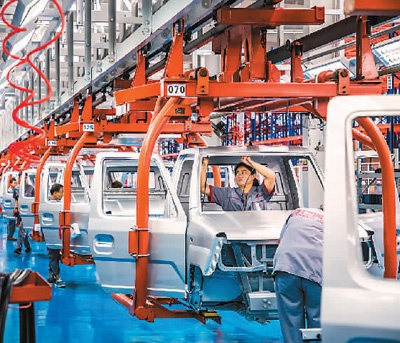

Tongren city in southwest China’s Guizhou province has established an early warning system to fight poverty and prevent people from falling back into it.

Employees work on a general assembly line at Guizhou Wanren Auto Groups in Wanshan district, Tongren, southwest China’s Guizhou province. The district uses funds for poverty alleviation as impoverished households’ share capitals in the company and allocates dividends to 750 impoverished people. (Photo/Peng Jun)
The system focuses on three key groups: households that have been lifted out of poverty but struggle to remain free of poverty, households whose incomes are less than 1.5 times the country’s poverty line - a per capita annual income of 2,300 yuan - and those who experience a drop in income or sudden increase in expenditure due to the COVID-19 epidemic or other reasons.
The system, piloted in the city’s Jiangkou county in 2018, was extended to cover the whole city last year and was recognized by the State Council Leading Group Office of Poverty Alleviation and Development as a good example for poverty alleviation.
Poverty alleviation officials can monitor these families’ incomes and expenses by logging in to the system through their smartphones and immediately sound the alarm in the event of a risk of returning to poverty caused by factors such as major spending.
Yang Zaiping, a 53-year-old man in Heiyan village in Jiangkou, used to work outside his hometown and had to pay school fees for four children, and his family had to live from hand to mouth. In 2018, his eldest daughter became ill, making things worse for the family.
After being identified as one of these households, the local civil affairs department offered Yang a subsistence allowance, while the education department waived school fees for all his children.
“The part of my daughter’s medical fees not covered by basic medical insurance was also paid by the local government,” Yang said.
The village recommended that Yang work as a taxi driver, and he can now earn 4,000 to 5,000 yuan per month. On top of that, his wife can earn about 1,000 yuan per month by tending to fruit trees at a red kiwi fruit base.
To prevent a return to poverty, Tongren has been fully leveraging existing poverty alleviation policies, including poverty alleviation through industrial development, vocational training, business startups, and subsidies for basic medical services, education and housing.
The city is also making good use of public welfare resources and special funds contributed by counties, townships and villages to prevent poverty.
These measures combine the government’s leading role in poverty relief and participation of all social sectors, said an official from the State Council Leading Group Office of Poverty Alleviation and Development.
“It’s especially important for households thrown into poverty by illness, disability or disasters to immediately implement the relevant relief policies, and to provide them with job opportunities and guarantee their basic lives,” the official added.
Thanks to Tongren’s efforts, by the first half of this year, nine out of 10 poor districts and counties in the city had been lifted out of poverty, and poverty incidence had been reduced to below 2 percent.
 Fire brigade in Shanghai holds group wedding
Fire brigade in Shanghai holds group wedding Tourists enjoy ice sculptures in Datan Town, north China
Tourists enjoy ice sculptures in Datan Town, north China Sunset scenery of Dayan Pagoda in Xi'an
Sunset scenery of Dayan Pagoda in Xi'an Tourists have fun at scenic spot in Nanlong Town, NW China
Tourists have fun at scenic spot in Nanlong Town, NW China Harbin attracts tourists by making best use of ice in winter
Harbin attracts tourists by making best use of ice in winter In pics: FIS Alpine Ski Women's World Cup Slalom
In pics: FIS Alpine Ski Women's World Cup Slalom Black-necked cranes rest at reservoir in Lhunzhub County, Lhasa
Black-necked cranes rest at reservoir in Lhunzhub County, Lhasa China's FAST telescope will be available to foreign scientists in April
China's FAST telescope will be available to foreign scientists in April "She power" plays indispensable role in poverty alleviation
"She power" plays indispensable role in poverty alleviation Top 10 world news events of People's Daily in 2020
Top 10 world news events of People's Daily in 2020 Top 10 China news events of People's Daily in 2020
Top 10 China news events of People's Daily in 2020 Top 10 media buzzwords of 2020
Top 10 media buzzwords of 2020 Year-ender:10 major tourism stories of 2020
Year-ender:10 major tourism stories of 2020 No interference in Venezuelan issues
No interference in Venezuelan issues
 Biz prepares for trade spat
Biz prepares for trade spat
 Broadcasting Continent
Broadcasting Continent Australia wins Chinese CEOs as US loses
Australia wins Chinese CEOs as US loses